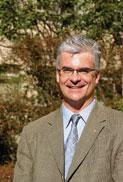Internationally speaking: MBA in Tokyo
Internationally speaking: MBA in Tokyo McGill University
User Tools (skip):
Internationally speaking: MBA in Tokyo
It's the first day of class and the room is abuzz with chatter in English and a smattering of Japanese. Students have assembled from all over the globe for McGill's MBA program. Even the instructor, Professor Alex Gallacher, has been flown in for the occasion. Such a cosmopolitan scene might be common in Montreal but in Tokyo, the home of the McGill MBA Japan program, the sight is exceptional.

Alex Gallacher basks in the sunshine of Tokyo, where he travelled to teach for McGill's MBA Japan program.
The program was established in 1998 when North American-style business schools became popular in Asia, with campuses popping up in Singapore and Hong Kong. Tokyo had no such program at the time, so with the determination of then-Associate Dean David Saunders and others at the Faculty of Management, McGill established the first Canadian graduate program in Japan.
The program grows in popularity every year, yet the classes are kept small with only 40 students accepted annually. Classes are held from 9 a.m. to 5 p.m. two weekends a month at Sophia University in the heart of downtown Tokyo. McGill professors and other visiting lecturers are flown in to teach two consecutive weekends.
Students hail from 15 countries, with half from Japan and another 10 per cent from Canada. MBA Japan participants are registered McGill students and may choose to spend a year in Montreal or two weeks in Beijing and Shanghai as part of their studies. Similarly, students in the MBA program in Montreal may set sail for Tokyo.
Today's agenda in Gallacher's human resource management class is on hiring practices. Small groups debate as Gallacher circulates. Having taught the Tokyo program for three years and for one year in Montreal, he says the two sides of the MBA are equal in quality, but distinct in character.
"The discussions here are very rich because of the fact they're informed by the diversity of the class in Tokyo," says Gallacher. "You can't be everywhere to know all the cultures, so here the cultures come to you in the classroom." Gallacher also runs a human resources consulting firm in Toronto and says that he learns as much from the classes as he puts in.
His sentiments are echoed by participants like second-year student Mari Noda. Noda says an interest in career development inspired her to pursue an MBA, but its reputation of internationalism brought her to McGill. "I have no experience living in a foreign country, so the program is a challenge for me," says Noda, a manager in the paint division of Dupont Tokyo. "There are many nationalities in the class and there is a great level of cultural interaction. It is beneficial to my career - now I am doing international tasks at my company."
The courses in international business take on new meaning when students grapple with the differences between Japanese business practices and those in their own country.
"The sense of team in Japanese organizations is strongly supported by the culture," explains Gallacher. "In Japan you are expected to participate in activities outside of work. While this creates a sense of cohesion, it also causes a lot of tension in the family that is historically linked to a lack of equality between men and women. This imbalance is a discussion we end up having without ever having to plan it."
The student population is 65 percent male and 35 percent female. Their employment records read like a who's who of big business - top multinational companies like Sony, Citibank, Goldman-Sachs, Mitsubishi, FedEx. Among MBA Japan students, both the average age of 34 and work experience of 10 years are higher than in a regular MBA program and this affects the dynamic of the class.
"The students are already working, so instead of being focused on job hunting, they are here for the knowledge and learning," says MBA Japan Director Scott Maltby. "Being able to discuss their recent experiences in their own workplaces, and then go out and immediately apply new concepts they learn, gives them a feeling that what they are learning in the classroom is relevant and practical. I think that keeps a certain activity and energy in the room."
For more information about the McGill's MBA in Japan, visit www.mcgillmbajapan.com

